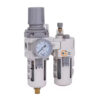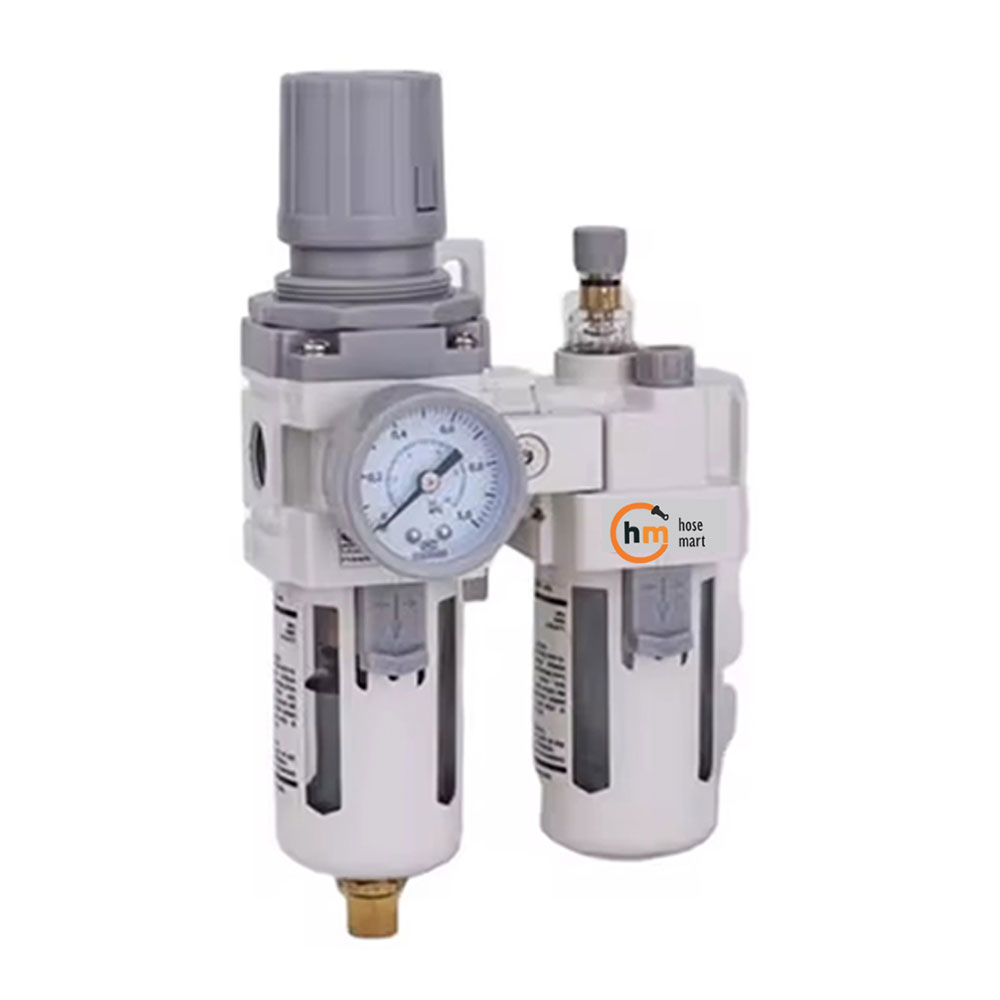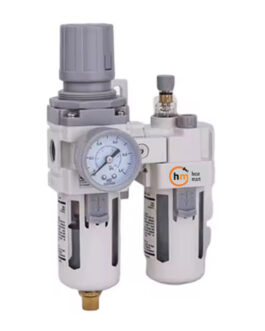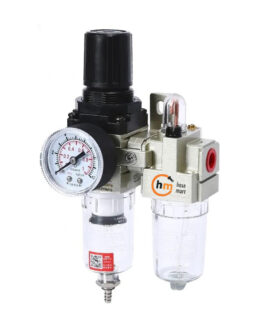HOSEMART Pneumatic FRL Unit (Air Filter + Regulator + Lubricator) with Metal Guard For Air Compressor Unit
₹1,300 – ₹3,300
- FRL (Filter Regulator Lubricator) with Metal Guard
- Operating Pressure (Bar): 10 kgf/cm2
- Applicable Temperature: 5-50°C
- Prepares air for all types of compressed air tools and equipment
- Light Weight / Compact Size / Back Mounting / Aluminum Casing
Description
Filter Regulator Lubricator (FRL Unit)
Pneumatic systems play a crucial role in various industries, providing reliable and efficient power transmission through compressed air. To ensure optimal performance and longevity of these systems, it is essential to maintain clean, regulated, and lubricated air. This is where Filter Regulator Lubricators (FRLs) come into play. FRLs are indispensable components that help enhance the overall functionality and efficiency of pneumatic systems.
Filter Regulator Lubricators (FRLs) are indispensable components that optimize the performance, reliability, and efficiency of pneumatic systems. By removing contaminants, regulating pressure, and providing lubrication, FRLs protect equipment, enhance performance, promote energy efficiency, and contribute to safer working environments. Their wide range of applications across various industries underscores their importance in ensuring smooth operation and productivity. Implementing FRLs is a wise investment that yields long-term benefits by extending equipment lifespan and reducing maintenance costs.
A Filter Regulator Lubricator, commonly known as an FRL, is an integrated assembly of three essential components: a filter, a regulator, and a lubricator. Each component serves a specific purpose to ensure the smooth operation of pneumatic systems. Let’s take a closer look at each of these components:
Filter
The filter in an FRL is designed to remove solid particles, moisture, oil, and other contaminants present in compressed air. By doing so, it prevents these impurities from entering the pneumatic system, safeguarding the downstream components from damage or malfunction.
Regulator
The regulator controls and maintains a constant and desired pressure level within the pneumatic system. It ensures that the compressed air supplied to various devices or tools is at the optimum pressure, allowing them to function accurately and efficiently.
Lubricator
The lubricator supplies a controlled amount of lubricating oil into the compressed air stream. This oil mist lubricates the moving parts of pneumatic tools and devices, reducing friction and wear, and extending their lifespan. It is particularly beneficial for applications involving rotary and reciprocating motion.
Key Benefits of FRLs
Implementing FRLs in pneumatic systems offers numerous advantages, some of which are outlined below:
- Equipment Protection: The filter component of an FRL effectively traps and removes contaminants present in compressed air. By doing so, it prevents debris, dust, moisture, and oil from entering the system and causing damage to valves, cylinders, and other sensitive components. This protection significantly reduces maintenance costs and extends the lifespan of the equipment.
- Improved Performance: By regulating the pressure, FRLs ensure consistent and controlled air supply to the pneumatic devices. This stable pressure enhances the performance and accuracy of tools, resulting in improved productivity and quality of output. Additionally, the lubrication provided by the FRL minimizes friction, reduces wear and tear, and contributes to smoother operation.
- Energy Efficiency: FRLs help optimize energy usage in pneumatic systems. The regulator component allows for precise pressure adjustment, avoiding excessive air consumption and reducing energy waste. By maintaining the required pressure levels, FRLs ensure that the system operates at an optimal level of efficiency.
- Enhanced Safety: FRLs contribute to safer working environments by preventing the entry of harmful contaminants into the pneumatic system. Clean and regulated air reduces the risk of malfunctions, system failures, and accidents. Moreover, the lubricator component of an FRL promotes smoother operation, reducing the chance of sudden tool failure or breakdown.
Applications of FRLs
FRLs find applications in a wide range of industries that rely on pneumatic systems. Some common examples include:
- Manufacturing: FRLs are extensively used in manufacturing industries for pneumatic tools, control valves, and cylinders. They ensure reliable operation and consistent performance in various production processes such as assembly lines, material handling, and packaging.
- Automotive: FRLs are crucial in the automotive industry for powering pneumatic tools, controlling air suspensions, and operating pneumatic cylinders. They enable precise control and efficient operation of pneumatic systems used in manufacturing, assembly, and vehicle maintenance.
- Construction: Pneumatic tools are widely employed in construction activities, such as drilling, nailing, and fastening. FRLs ensure the longevity and optimal performance of these tools, even in challenging environments with high levels of dust and debris.
- Pharmaceuticals: In pharmaceutical manufacturing, FRLs play a vital role in ensuring clean and contaminant-free compressed air. They contribute to maintaining the integrity and quality of the manufacturing process by preventing particles or moisture from contaminating the products.
Additional information
| Weight | N/A |
|---|---|
| Dimensions | N/A |
| Thread Size | 1, 1/2, 1/4, 3/4, 3/8 |
Only logged in customers who have purchased this product may leave a review.





Reviews
There are no reviews yet.